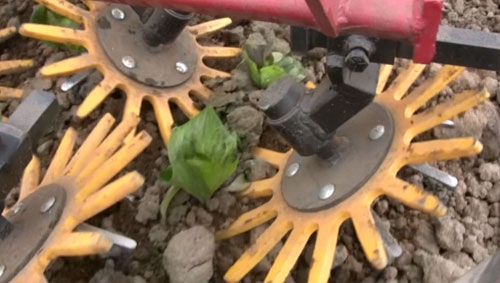New technologies offer promising options for organic weed control
Poets have romantically suggested that a “weed is no more than a flower in disguise.” But when burning nettle, pigweed and purslane rob water, sunlight and nutrients from vegetables you are growing to make a living, weeds are a despised nemesis.
For conventional growers, chemical herbicides have taken the drudgery out of weed control. For organic farmers, weeds continue to be a perennial headache.
Many large-scale organic growers have turned to mechanical cultivators to dislodge weeds. However, standard cultivation systems leave an untouched band of soil around the seedlings that must be cleared by hand. This hand labor often represents a large part of total production expenses.
Richard Smith, a UC Cooperative Extension advisor in Monterey County who specializes in vegetable production and weed control, heard about “finger weeders” while at a conference in Germany.
“There is a brand available in the U.S., but the European design is much better,” Smith said.
He purchased a finger weeder from the German Kress Company and conducted trials on commercial farms in Monterey County to assess their effectiveness in organic vegetable production. With this system, hard plastic discs with long fingers are pulled by a tractor horizontally down the field, dislodging recently germinated weeds while leaving transplanted vegetables unharmed.
The timing of cultivation is critical. For transplanted vegetables, the cultivation must be done after the plants are firmly rooted and weed seedlings have just one small, tender root. Soil moisture also influences the effectiveness of the finger weeder.
In a trial Smith conducted on organic leeks, the finger weeder removed 80 percent of weeds, while the standard cultivator removed 29 percent. Hand weeding time was reduced by 45 percent, from 19 hours per acre to 10 hours per acre. The yield of the leeks was not affected by the finger weeder cultivation.
On an organic radicchio farm, the finger weeder removed 81 percent of weeds, while the standard cultivator reduced 48 percent. Hand weeding time was reduced 44 percent, and the yield was unaffected.
In six out of eight trials, the finger weeder significantly reduced hand weeding time compared to standard cultivation.
“We want to raise awareness among our growers that this is a viable option for weed control on organic farms,” Smith said.
Smith is also studying other high-technology organic weed control systems, such as computer-guided cultivation equipment.
“There is tremendous potential in this technology, but it is very expensive,” Smith said.
For more information on organic weeding options, see the video below:


